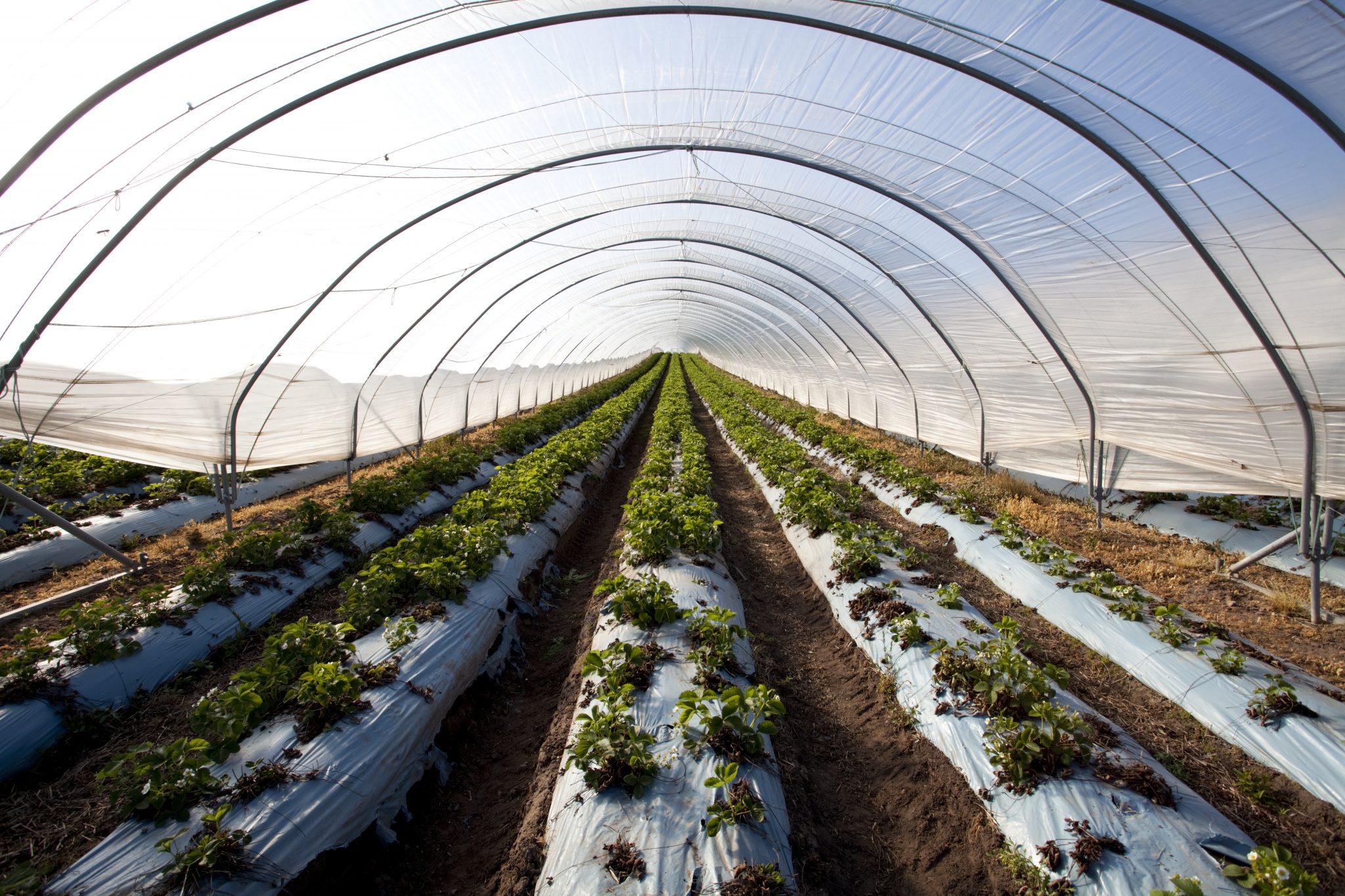Crop Production

Adoption of organic practices in Alabama has grown in recent years. This growth has been paralleled by an increase in marketing opportunities. Producer-only farmers markets, community-supported agriculture, and online sales platforms have grown, and consumers can now find organic fruits, vegetables, herbs, milk, and meats, all produced in Alabama.
Organic farming has grown into a $50 billion industry in the United States. Interest in organic production began in the United States in the 1960s and 1970s amid concerns about the effects of agricultural chemicals on human health and the environment. These concerns led to a desire for farm products raised without synthetic chemicals. Alabama’s oldest organic farms were established in the 1980s, but the broader adoption of organic farming practices lagged behind other parts of the country. Skepticism and a lack of information about organic farming methods, lack of consumer demand, and the challenging climate all played roles.
Despite these challenges, the adoption of organic practices in Alabama has grown in recent years. This growth has been paralleled by an increase in marketing opportunities. Producer-only farmers markets, community-supported agriculture, and online sales platforms have grown, and consumers can now find organic fruits, vegetables, herbs, milk, and meats, all produced in Alabama.
Organic Certification
To create a uniform set of standards for what can be labeled organic, the United States Department of Agriculture (USDA) developed the National Organic Program (NOP) regulations in 2001. The standards outline requirements for organic production, with input from a board made up of a spectrum of farmers, processors, retailers, scientists, and environmentalists. The standards prohibit the use of genetically modified organisms and synthetically produced fertilizers and pesticides; they also regulate the use of nonsynthetic inputs. Land can be certified organic after at least 3 years, during which time no prohibited product has been applied.
Organic production is much more than a list of approved inputs, however, and requires a good understanding of a complex farm ecosystem. Organic farming is an ecological approach to healthy soil, plants, and animals. On organic farms, soil fertility is enhanced using manure and compost, mulch, mined minerals, and other natural products. Crop rotation is also an essential element—farmers alternate types of crops in a pattern that interrupts pest life cycles and improves soils. Insects, weeds, and diseases are managed by creating conditions that encourage healthy plants and natural predators. If these practices are not successful, approved organic pesticides are allowed.
 To be certified, organic growers must meet a comprehensive set of standards that are outlined in an organic system plan, a key component of the certification process. The organic system plan provides details about every aspect of the farming operation, from land use and management for the past 3 years to sources of seeds and inputs to harvest and packing and transportation of product to market. Keeping good records is essential to ensure that all practices can be traced by product and field. While it may seem challenging, a good organic system plan can be a great management tool.
To be certified, organic growers must meet a comprehensive set of standards that are outlined in an organic system plan, a key component of the certification process. The organic system plan provides details about every aspect of the farming operation, from land use and management for the past 3 years to sources of seeds and inputs to harvest and packing and transportation of product to market. Keeping good records is essential to ensure that all practices can be traced by product and field. While it may seem challenging, a good organic system plan can be a great management tool.
Organic certification is obtained through an accredited certifying agent. Alabama farms work with agencies based around the country, from California to Florida. The certifying agency reviews and approves the organic system plan and any changes made throughout the year. Certification is renewed annually.
For more information about certification, refer to the following:
- The National Organic Program (NOP), which provides current regulations, lists of certifying agencies, and much more information
- The Appropriate Technology Transfer for Rural Areas (ATTRA), which provides extensive information about organic certification as well as a wide variety of publications and resources for small farmers
- The Rodale Institute, which has researched organic farming methods for more than 60 years. Their electronic organic system plan tool helps farmers assemble the necessary documentation to apply for organic certification through an accredited certifying agent.
Allowed and Prohibited Inputs
The NOP regulates the types of products that are allowed and prohibited in organic production. Many materials are allowed in a limited set of circumstances or depending on the purpose or how they are processed. To help producers understand their options, the Organic Materials Review Institute (OMRI) and the Washington State Department of Agriculture publish lists of selected products that they have reviewed and found to be acceptable for a specified use in organic farming. Organic certifying agencies also maintain their own lists; products that are not listed can be reviewed by an agency as needed.
The certifying agency makes the final determination on every product planned for use in an organic system. The best way for a producer to be certain that a product is allowed for use in their organic system is to have a certifying agency review it. Even if a producer is not ready for certification, it is a good idea to develop a relationship with a certifier who will review and approve products before their use.
For more information, refer to the Organic Materials Review Institute website and the Washington State Department of Agriculture.
Alternatives to Organic Certification
Very few Alabama producers who use organic methods are certified organic. Smaller farms are exempt from certification if they sell less than $5000 worth of organic products annually. They may call their products organic, but they may not use the words certified organic or use the USDA label. They are, however, expected to meet the same regulations as certified organic growers.
Other growers, mainly those who sell directly to their customers at farmers markets or through a CSA, may use a word other than organic to describe their farming practices or use an alternative label such as certified naturally grown. These growers generally rely on a more direct relationship with their customer base to demonstrate their commitment to organic farming methods.
A recent push for a more holistic organic standard based on soil health has resulted in a new regenerative organic certification, now in its pilot phase. The regenerative standard includes additional soil management, pasture- based livestock, and labor-management requirements that were not included in the national standards.
Learning How to Grow Organically
Organic farms are often complex systems, with mixed cash and cover crops rotated over many years. Developing an organic farming system that works for your operation and your site will require some experimentation. Experienced organic growers are generally willing to share insights into what has worked well and not so well over the years. Attending field days, conferences, and workshops, visiting local farms, and volunteering or working on organic farms are all worthwhile investments when getting started.
For more information refer to the following:
- The Alabama Extension Beginning Farmer program provides opportunities for new and beginning farmers to learn about sustainable and organic production, including online and in-person meetings and individual technical assistance.
- The Alabama Sustainable Agriculture Network (ASAN) provides opportunities for networking and training, including a regular newsletter and an annual conference.
- eOrganic provides a clearinghouse of information about organic farming, including links to other state and regional groups in the southeast.
Certification Cost and Cost Share
The costs of certification vary by certifying agency and farm size, type, and location, generally starting around $500. The USDA offers a cost share that covers the annual cost of organic certification; the program reimburses 75 percent of the cost of certification up to $750. The program is administered by the Alabama Department of Agriculture and Industry and the USDA Farm Service Agency.
The Natural Resources Conservation Service (NRCS), a branch of the USDA, offers financial and technical assistance for organic and transitioning producers through the Environmental Quality Incentives Program (EQIP) and the Conservation Stewardship Program (CSP). The program can help pay for organic farm planning and conservation practices such as cover cropping, mulching, and micro-irrigation. Visit USDA NRCS Alabama to sign up and learn more.
Download a PDF of Organic Crop Production, ANR-2728.


